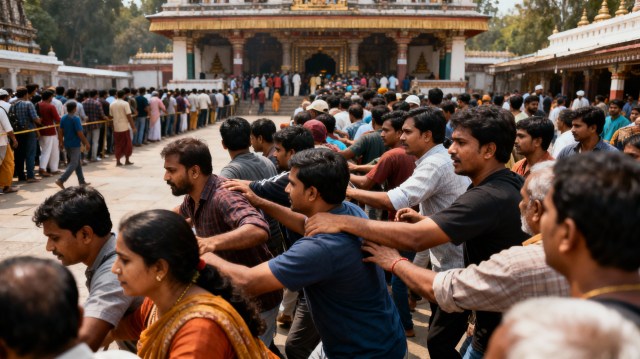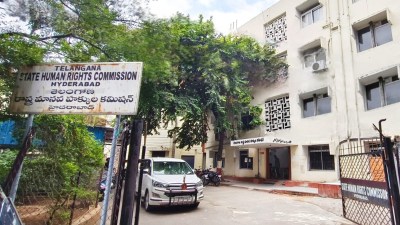Guruvayoor temple guidelines: The Kerala High Court on Friday laid down comprehensive guidelines for crowd and queue control and said the temple committee was under a “sacred legal and moral duty” to safeguard the welfare of devotees.

The court said it was necessary for the temple authorities to rethink the problem not merely as “how to manage the queue” but fundamentally as “how to avoid the queue.”
The Devaswom managing committee, as trustee, is under a sacred legal and moral duty to safeguard the welfare of devotees. Since temple administration is funded through offerings made by devotees, their rights and needs are paramount. No devotee should leave the temple with a sense of grievance or dissatisfaction, “ the order said.
Referring to the provisions of the Guruvayoor Devaswom Act, 1978, the court held that the committee was “bound to protect the interests of its devotees” and must ensure a “hassle-free darshan” to the devotees.
The Guruvayoor Sree Krishna Temple, the court noted, is often considered as the “Dwaraka of South India” and “Bhooloka Vaikuntam” (the abode of Lord Krishna on earth), citing the belief that the idol is over 5,000 years old.
Temple’s position on rituals and schedules
State standing counsel Vipin Das, representing the Guruvayoor Devaswom, said that the temple strictly adhered to the rituals prescribed by Adi Shankaracharya.
Story continues below this ad
Das also argued that there are days when special offerings such as Udayasthamana Pooja are performed which may cause unavoidable delays. For the virtual queue system, he argued that it may not be entirely feasible due to the peculiarities of the ritual schedule.
However, the court held that the technology could be adapted to complement, not compromise, traditional tantric practices and instructed the temple committee to prepare a comprehensive action plan, after consultation with the various stakeholders within two months from the date of receipt of a copy of this judgment.
- The following guidelines were, therefore, issued.
- A scientific study for determining the maximum number of devotees which can be accommodated safely by the temple on normal and festival days should be carried out. The daily cap should thereafter be fixed accordingly.
- One designated entry and one designated exit point to streamline the movement of devotees.
- Classification of devotees in different groups of A, B, C, D and so on, with 300–500 persons per group.
- Mandatory Aadhaar card/voter ID for spot-booking of devotees for security purposes.
- Each group shall be allotted tentative time slots to prevent prolonged waiting.
- A mobile application that provides real-time updates of the darshan progress.
- At least two days a week, which may be dedicated exclusively to online booking, benefiting devotees from distant locations.
- Priority darshan for special categories of people like senior citizens, differently-abled persons, pregnant women, and those with infants shall receive priority darshan.
- Regular training for committee staff must be provided to improve efficiency, discipline, and courteous behaviour.
- Quality and satisfactory darshan shall be provided to the devotees.
- Darshan hours may be increased by optimising ritual closures.
The court directed the formation of a permanent multi-departmental committee with members including the district collector and superintendent of police, Thrissur, environmental engineer, district coordinator, district medical officer, and Devaswom officials to implement the guidelines.
Sacred duty to protect interests, welfare of pilgrims, devotees
The court said the verses of the Bhagavad Gita, a foundational Hindu scripture, and Srimad Bhagavatham, a book renowned for its profound devotional philosophy and spiritual insight, underscore the “sacred duty to protect the interests and welfare of pilgrims and devotees” and ensure that they are treated at all times with the highest degree of care, respect, and consideration.
Story continues below this ad
Justice Jayakumar, who authored the verdict, took the verses of the Bhagavad Gita and jotted down its Chapter 9 Verse 29 and its English translation, and said, “I am equal to all beings; none is dear to Me and none is disliked. But those who worship Me with devotion dwell in Me, and I dwell in them.”
The court also looked into the verses of Srimad Bhagavatham and pointed the Canto 9, Chapter 4, Verse 65 of the holy book, which says in English translation, “Those who, with exclusive devotion, worship Me-giving up all worldly duties and relationships for My sake-if anyone creates obstacles for them, I cannot tolerate it. I immediately act to remove their distress.”
Hardships of devotees
One of the petitioners, P N Radhakrishnan, had filed the plea to seek reintroduction of the online booking facility for darshan in the temple, which was provided during COVID pandemic period of 2022 when the temple authorities implemented an online virtual system, and then it was withdrawn irrationally.
Another devotee and petitioner, Sumesh CM, in his plea, highlighted the hardships and difficulties faced by devotees standing in the queue for hours every day to obtain darshan at Guruvayoor Sreekrishna Temple.
Story continues below this ad
The third matter considered by the Court was registered suo motu after Adv. Lekha Suresh submitted a complaint detailing the bitter experience she had to endure at the temple during the Ekadashi festival in 2024.

































